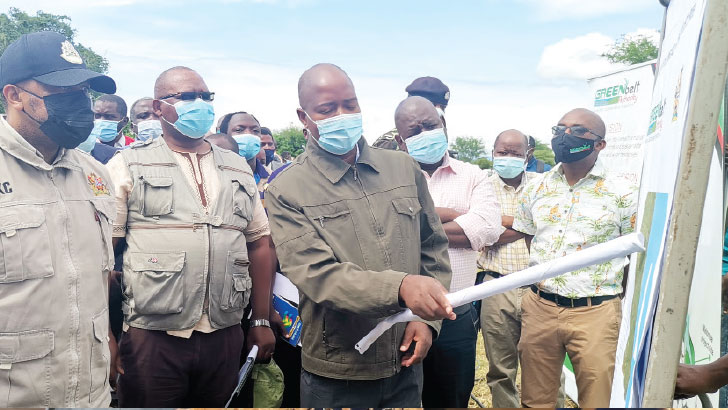Funding woes choke K31bn rice project
Vice-President Saulos Chilima has expressed concern over delayed progress on the K31 billion Nthola-Illola-Ngosi Rice Production Scheme project in Karonga which has this year received just over K100 million.
But Chilima and the Green Belt Authority (GBA), which is championing the project, are hopeful that government will provide about K1 billion in the next fiscal year for the scheme which is expected to be completed in five years.
Speaking after touring the project site yesterday, the Veep said when the project is completed, it could create 14 000 jobs and increase rice production.

The project seeks to develop over 1 000 hectares (ha) of irrigable land and produce 15 000 metric tonnes (MT) of rice annually. The scheme will cost $40 million (about K31.2 billion), comprising $15 million for scheme development and $25 million for the agro- processing facility.
Said Chilima: “The intentions are good, but we need to move fast, we are too slow sometimes. We have to look at the Public Sector Investment Programme [PSIP] component, but the reason we are asking for a full story is that we must also begin to look at alternative sources of financing.
“If we didn’t have it in the PSIP, that’s not the end of story, there are financiers of sorts, people could come in as partners, or indeed if we see that sinking K30 billion in this investment will bring us more, we should be rushing to the bank to borrow money to make this happen.”
He said government remained committed to supporting the project, indicating that the GBA and the Ministry of Economic Planning, Development and Public Sector Reforms will be engaging as the new financial year commences in July.
Said the Veep: “If we were not lucky to find resources locally, let’s see how we can support them. On mega farms, we have been slow due to Covid-19 because some of the people that expressed interest to partner with us have not been able to show up.
“Then there is the fiscal pressure that we are experiencing, but that is still very much on the cards. This country will remain very much agrarian for quite a bit. In the next 12 months, we should be seeing some progress, nothing has been dropped, but we need to pick up better pace.”
Chilima challenged the GBA to provide detailed business information on the project, such as how much proceeds are expected once the K30 billion is injected, and that the five years for the project was too long, asking how much it would take to have it completed in two years.
On his part, GBA director of irrigation operations Eric Chidzungu admitted the slow pace of the project, but said there are processes being followed, such that it has taken them almost three years to complete a feasibility study and detailed design.
He said: “I am happy that the Vice-President has committed that instead of five years, we might look at two years if all these resources are provided. We need about K10 billion for the infrastructure and K20 billion for the processing plant.”
In a separate interview, GBA spokesperson Maganizo Mazeze said the authority would complete construction within two years if K10 billion is provided.
The Nthola-Illola-Ngosi Rice Production Scheme will be located in Traditional Authority Kyungu, where about 14 000 persons in about 2 400 families are expected to be direct beneficiaries.
According to Ministry of Agriculture, rice production in Malawi has been declining since 1975.
Malawi has 600 000 ha that can be used for rice production. If this area was fully utilised, the country could produce at least three million tonnes of rice per annum.





